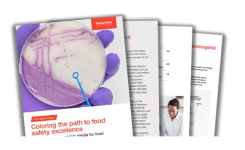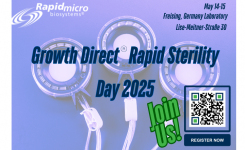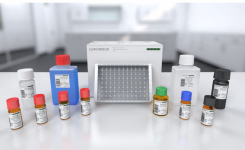Ultra-rapid Next-generation Thermal Cycler could bring PCR to POC
go back to news archives| BJS Biotechnologies has launched its new rapid next-generation thermal cycler, UF1, at BIOTECHNICA 2010, in Hannover, Germany (5-7 October 2010). UF1 increases the speed of DNA amplification by up to ten-fold, opening up opportunities for the use of PCR in Point-of-Care diagnosis. Thermal cyclers raise and lower the temperature in PCR, breaking the DNA strands apart and promoting DNA replication. These traditionally use a heat exchange block to warm and cool DNA samples in plastic tubes or microtitre plates, but this can result in slow and uneven temperature changes, and exact temperature control is vital for fast and efficient DNA amplification and accurate and consistent results. The UF1 thermal cycler uses a low-cost single-use, recyclable consumable that combines the microtitre plate, heat exchange block, and attached heaters. This puts the DNA samples in direct contact with the heating element, resulting in rapid and controlled temperature changes, at up to seven cycles per minute. The disposable plate is simple to use, decreasing user error, eliminates the time and cost involved in cleaning, as well as reduces the risk of cross-sample contamination. 'Current real-time PCR thermal cyclers are both expensive and slow. We developed the technology because we had become frustrated with the limited power and heat, as well as the lack of thermal uniformity, from cyclers using the Peltier effect devices,' says Ian Gunter, R&D Director, BJS Biotechnologies. 'UF1 provides reliable and reproducible results within five to six minutes, compared with one to two hours for thermal cyclers that rely on heat exchange. This means that one machine could do the work of ten, freeing up bench space and increasing laboratory productivity,' says Richard Lewis, Managing Director, BJS Biotechnologies. UF1´s process speed means that it has potential in situations needing rapid diagnoses, for example at Point-of-Care in epidemics such as foot & mouth or swine flu, or for detecting MRSA infections in hospital A&E settings. Other applications could include biopsies, identification of water-borne disease, detection of micro-organisms in biological warfare or bio-terrorism, and tracking contamination in the food manufacturing industry, as well as pharmacogenomics in personalised medicine. BJS Biotechnologies is in discussion with a number of European distributors, and UF1 will be rolled out across Europe in early 2011, beginning in the UK. UF1 is expected to sold at a far lower cost than most other real-time thermal cyclers on the market. |
NOTE: This item is from our 'historic' database and
may contain information which is not up to date.
Source : BJS Biotechnologies View archived contact details
Posted on October 5, 2010
















